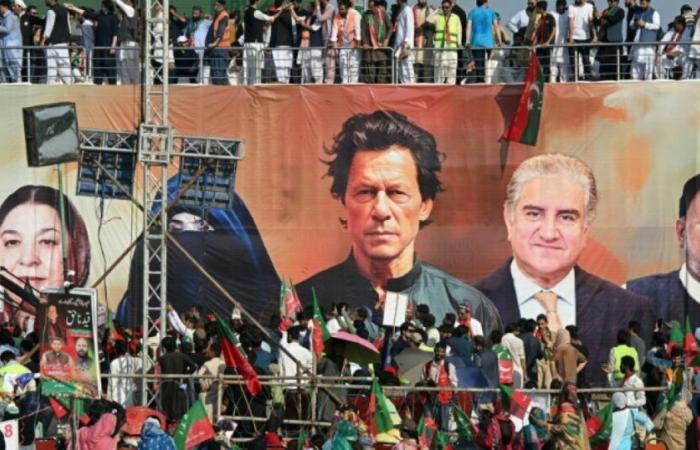Four paramilitaries were killed Tuesday in Pakistan in clashes between security forces deployed en masse in Islamabad and thousands of supporters of former Prime Minister Imran Khan who entered the capital early to demand the release of their champion.
The crowd advances towards D-Chowk, the square where the demonstrators intend to put pressure on the authorities who sit in the adjacent district, in order to obtain the release of their champion, currently imprisoned and prosecuted in around a hundred cases.
Several ministers announced the death of the four paramilitaries, run over according to them by demonstrators in a vehicle. On Monday evening, the police reported the death of one of their officers, killed outside Islamabad, when the demonstrators marched towards the capital.
Galvanized by Bushra Bibi, the 72-year-old former cricket star’s just-released wife, thousands of them entered Islamabad.
Not without difficulty: first, they had to move the hundreds of containers installed to block the roads.
Then, at regular intervals, they received volleys of tear gas canisters and rubber bullets from the cordons of police and paramilitaries stationed at regular intervals.
The demonstrators responded with more tear gas canisters, throwing stones and sticks.
They are now only a few kilometers from D-Chowk, the political heart of the fifth most populous country in the world where Prime Minister Shehbaz Sharif is at the same time welcoming Belarusian President Alexander Lukashenko with great fanfare.
– 20,000 police and paramilitary –
Since Sunday, “more than 20,000 members of the security forces have been deployed”, according to the Islamabad police.
Interior Minister Mohsin Naqvi was clear by visiting D-Chowk several times during the night: “Those who come here will be arrested.”
Washington “urged” the authorities to “respect human rights”, while calling on the demonstrators to be “peaceful”.
If all night long the local media spoke of attempts at negotiations between the government and the Tehreek-e-Insaf (PTI), Mr. Khan’s party, few people imagine a calm de-escalation.
Because the two camps have been raising tension for days around what the PTI presents as “its last act”.
The call to demonstrate had been launched for Sunday. So, the PTI procession set off from the provinces bordering the capital – Punjab in the east, where Imran lived for a long time, and Khyber-Pakhtunkhwa, stronghold of the PTI, in the west.
– “Containeristan” –
It took more than 48 hours to arrive at the gates of Islamabad, where Mr. Khan, 72, is incarcerated.
On the other hand, the authorities had pulled out all the stops, going so far as to raise questions.
At the start of the week, Islamabad had triggered “article 144” which prohibits any gathering of more than four people – for two months. Punjab, where more than half of Pakistanis live, followed suit on Saturday, for three days.
“The authorities live in a siege mentality – a state in which they always see themselves in danger and live in permanent fear of being overthrown,” accuses Maleeha Lodhi, a former Pakistani diplomat, in an article.
Dawn, the leading English-language daily, “wonders if the Islamabad police are preparing for a war” with hundreds of containers scattered across the streets.
“Islamabad will once again turn into +Containeristan+. Is this really necessary?,” continues Dawn.
Islamabad’s schools remain closed and the state insists that “the mobile internet network and wi-fi will be cut” wherever it sees “a danger”. Since Sunday, no neighborhood has escaped these cuts.
The Human Rights Commission of Pakistan (HRCP), the main NGO defending freedoms in the country, denounces blockages which “penalize ordinary citizens, in particular daily workers whose income depends on freedom of movement”.
– “Sacrifice our lives for him” –
The pro-Khan, for their part, invariably brushes aside threats.
“We are ready to sacrifice our lives for him and we will go to D-Chowk,” Kalat Khan, 56, who introduces himself as “a soldier of Imran Khan,” told AFPTV.
“We will stay there until Imran Khan is released,” adds Raïs Khan, 36.
The head of government of Khyber-Pakhtunkhwa, Ali Amin Gandapur, continues to taunt the authorities: “You can shoot at us, bomb us and block the roads with your containers. If it gets out of hand, you will be responsible.”
Mr. Khan, in power from 2018 to 2022, is currently being prosecuted in around a hundred cases concerning violent demonstrations by his supporters.
In July, a panel of UN experts called for his release, deeming his detention “arbitrary”.






